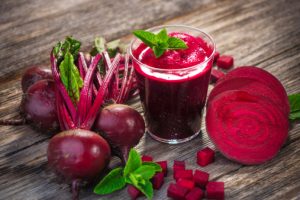 Researchers from Washington University School of Medicine have found that beet juice, because of its nitrate contents, could be beneficial for individuals who have experienced heart failure. The findings are based on previous research which revealed that beet juice can help boost muscle power in athletes.
Researchers from Washington University School of Medicine have found that beet juice, because of its nitrate contents, could be beneficial for individuals who have experienced heart failure. The findings are based on previous research which revealed that beet juice can help boost muscle power in athletes.
Lead author Linda R. Peterson said, “It’s a small study, but we see robust changes in muscle power about two hours after patients drink the beet juice. A lot of the activities of daily living are power-based – getting out of a chair, lifting groceries, climbing stairs. And they have a major impact on quality of life. We want to help make people more powerful because power is such an important predictor of how well people do, whether they have heart failure, cancer or other conditions. In general, physically more powerful people live longer.”
Advertisement
Previous research on cyclist’s performance after the consumption of beet juice prompted the recent research to find out if beet juice could benefit heart patients as well. Nine patients who had experienced heart failure were used for the small study. Two hours after receiving concentrated beet juice as a form of treatment, researchers noted that muscle power increased by 13 percent.
Patients received the beet juice treatment along with a placebo, acting as their own control. Along with the benefits of muscle power, participants did not experience any adverse side effects like an increase in heart rate or a drop in blood pressure.
Peterson added, “The heart can’t pump enough in these patients, but that’s just where the problems start. Heart failure becomes a whole-body problem because of the metabolic changes that happen, increasing the risk of conditions such as insulin resistance and diabetes and generally leading to weaker muscles overall.”
Nitrates can be found in beet juice, spinach and other leafy green vegetables. When nitrates enter the body they are turned into nitric oxide which relaxes blood vessels and can benefit the metabolism.
Advertisement
Researchers are intrigued to further their research in senior populations to observe benefits which they may obtain by enjoying more nitrate-rich foods.
Corresponding author Andrew R. Coggan concluded, “One problem in aging is the muscles get weaker, slower and less powerful. Beyond a certain age, people lose about one percent per year of their muscle function. If we can boost muscle power like we did in this study, that could provide a significant benefit to older individuals.”
